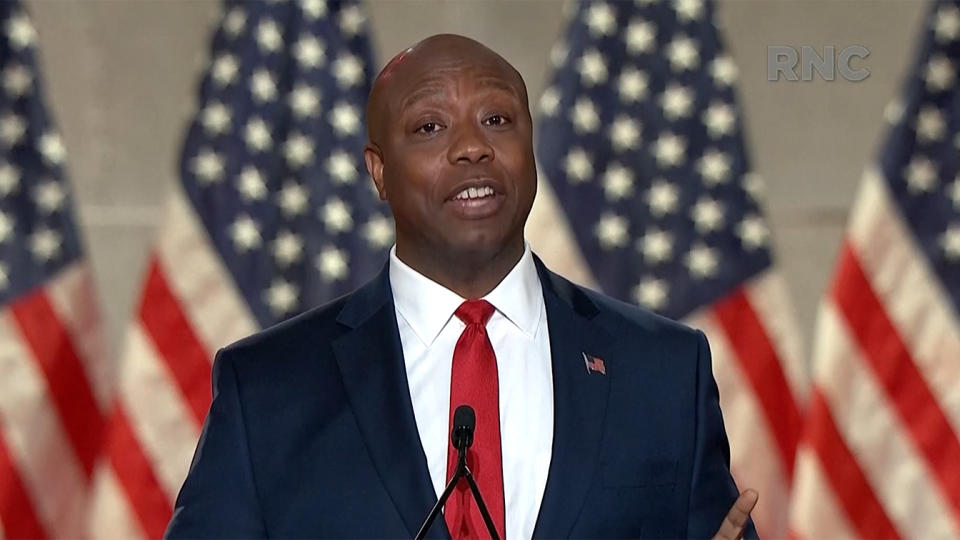Tim Scott, for years a tepid Trump ally, gives the president a boost
The most prominent Black Republican in the United States closed out the first night of the 2020 Republican convention by accusing Democrats of wanting to impose a “socialist utopia” on the country.
South Carolina Sen. Tim Scott has been both an ally and a critic of President Trump, but on Monday night, he jumped on board with the Republican president’s bid for a second term.
Scott avoided hyperbole in discussing about Trump’s record. Instead, he focused on economics and school choice, and gave the president modest praise. His appearance was the culmination of a night on which several Black and Latino speakers sought to win over voters of color to the Republicans.
But when the senator, a 54-year old former insurance salesman, turned his focus to the Democratic nominee, former Vice President Joe Biden, he briefly escalated his rhetoric.
Scott said that Biden and his running mate, Sen. Kamala Harris of California, “want a Cultural Revolution,” the term used to describe the violent Maoist upheaval in China during the 1960s and ’70s that sought to destroy all vestiges of pre-communist life there.
“If we let them, they will turn our country into a socialist utopia, and history has taught us that path only leads to pain and misery,” Scott said of the Democrats.
Scott reserved his greatest displeasure for Biden when quoting some of the former vice president’s gaffes on racial matters.
Scott recalled Biden’s remark in May that if a person of color votes for Trump they “ain’t black,” a comment for which Biden has apologized, saying it was a joke made in bad taste.
Scott also referred to another comment earlier this month, when Biden said that “unlike the African-American community, with notable exceptions, the Latino community is an incredibly diverse community with incredibly diverse attitudes about different things.” Biden has also apologized for that remark.

Scott is a singular figure in American politics: the only Black Republican in the U.S. Senate, and one of only 10 Black senators in American history. He has spoken on the Senate floor about his experiences of being discriminated against because of the color of his skin.
After George Floyd’s killing this year, Scott said that “to suggest that there aren’t racial challenges and patterns is for someone to be blind.” He told Yahoo News at the time that “if you have a system that leads to an unjust outcome, and that system is a system of authority. … That does not lead to a society of order. It leads towards a society of chaos.”
But Scott, who was elected to office in a conservative Southern state by mostly white voters, has avoided using the term “systemic racism.”
On Monday night, Scott blamed Democrats for unrest in American cities like Portland, rather than “unjust systems.” He also blasted Democrats for what he said was a bad-faith effort to reform policing after of Floyd’s killing.
Scott has not spared Trump from criticism in the past, although he is usually more restrained in his comments.
Scott said Trump’s tweets in June that “When the looting starts, the shooting starts” and other inflammatory comments posted on Twitter by the president were “not constructive.” He also spoke directly to the president about his views on the matter.
Scott has also criticized the president’s use of federal officers to attack peaceful protesters so he could stage a photo op at a church across from the White House.
In 2017, when Trump said that “very fine people” were among those marching in Charlottesville, Va., chanting anti-Semitic and racist slogans, Scott also called out the president, saying that Trump’s “moral authority” had been “compromised.”
That got the White House’s attention, and Scott was invited to the White House for a meeting. There, the senator pushed Trump to consider his proposal to implement what Scott calls “opportunity zones,” which seek to attract investment capital to low-income neighborhoods.
The idea, similar to one pushed by the late New York Republican Rep. Jack Kemp in the 1980s and ’90s, has been received with a mixture of skepticism and cautious encouragement by Democratic economists.
In his address Monday, Scott leaned heavily on his personal history as a Black man growing up in the South. As a way of emphasizing how much the United States has changed in recent decades, he noted that his first victory to Congress came after he defeated a descendant of Strom Thurmond, the segregationist Democrat senator who became a Republican.
“My grandfather’s 99th birthday would have been tomorrow. Growing up, he had to cross the street if a white person was coming. He suffered the indignity of being forced out of school as a third grader to pick cotton, and never learned to read or write,” Scott said.
“Yet, he lived to see his grandson become the first African-American to be elected to both the United States House and Senate. Our family went from cotton to Congress in one lifetime. And that’s why I believe the next American century can be better than the last.”
_____
Read more from Yahoo News:
You don't need the U.S. Postal Service to deliver your mail-in ballot
'I trusted them.' Some 'Build the Wall' donors feel cheated by Bannon. Some don't care.
Exclusive: DHS warns of fake election websites potentially tied to criminals, foreign actors
Oleandrin, touted as COVID-19 cure, has no scientific support



